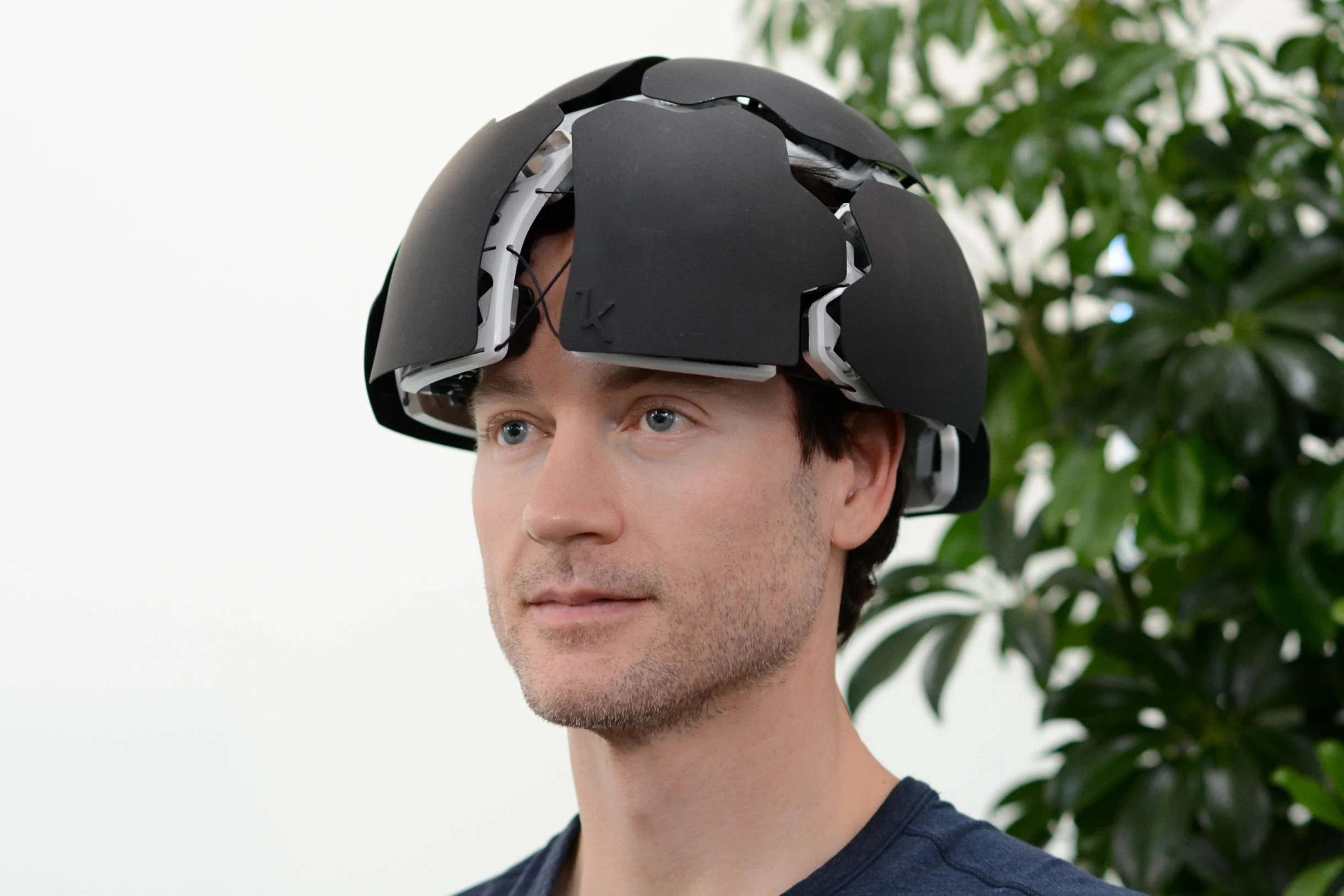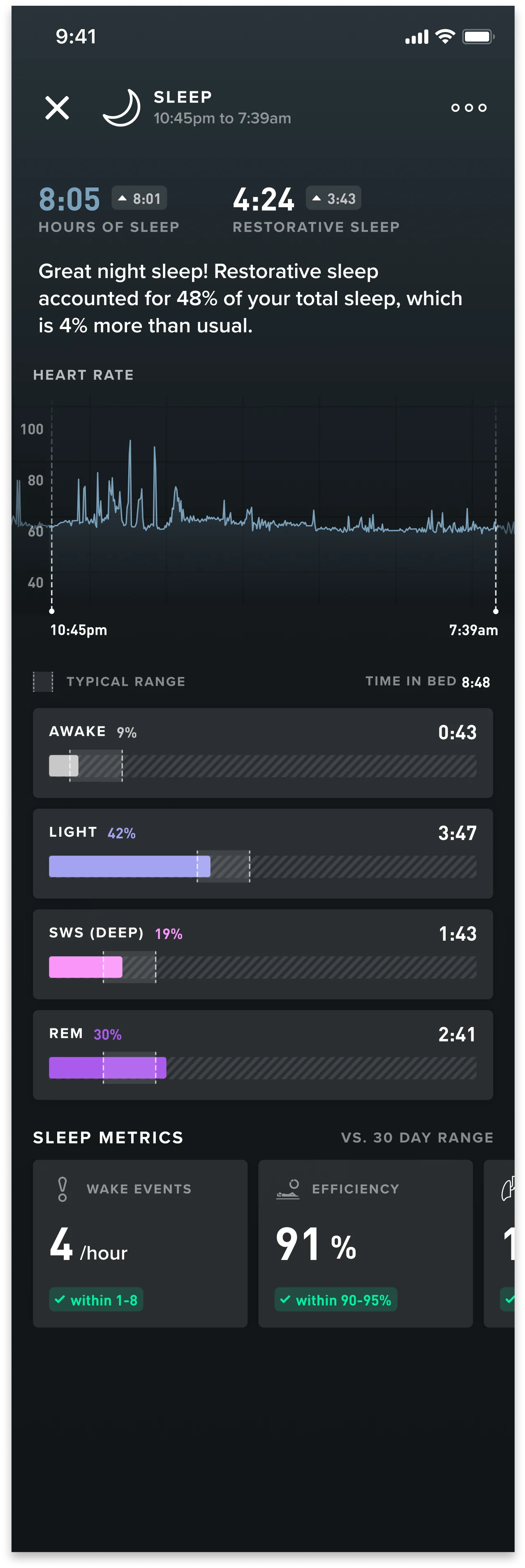Topics
- Article
- Research Studies
New Brain Interface Technology Uses WHOOP in Study to Monitor Connection Between Sleep & Impulse Control

How improving your sleep may actually be the answer to resisting late-night snacks.
For the past several years WHOOP has helped people monitor their bodies in new and profound ways, which in turn has given insight into how their behaviors affect them. We have heard from countless members about significant behavior changes they’ve made based on our strain, recovery and sleep data. When we started WHOOP in 2012, nobody was routinely measuring their heart rates continuously or their sleep every night, and the idea of a daily recovery metric did not exist. Since that time, we’ve seen how powerful the idea of monitoring our bodies 24/7 can be. In many ways, the idea of tracking the activity of our brains is at a similar place as our physiological monitoring was 9 years ago. It makes sense that there would be a lot of deeply meaningful and impactful analyses and recommendations that could come from monitoring the brain. However, it seems a daunting task--the brain is incredibly complex and machinery to monitor it has always required specialists and equipment that can weigh multiple tons. There are also no standard “numbers” for brain activity in the basic vernacular like we have for describing our strain, recovery or sleep.
Meet Kernel: Consumer-Friendly Brain Activity Imaging
Bryan Johnson, the Founder and CEO of Kernel, is an incredibly accomplished individual. He was previously Founder and CEO of Braintree Venmo and successfully grew the payment processing company to its acquisition by PayPal. Bryan firmly believes in the power of monitoring and understanding his body to make adjustments in his lifestyle that unlock peak performance. His sleep routine, fine-tuned through in his words “thousands of self experimentations,” would fit in with even the most die-hard WHOOP members:
- Dinner (last meal of the day) at 10 am to fast 10 hours before sleeping
- 8 pm bedtime
- Blue light blocking glasses
- 67-degree bedroom
- Meditate before bed
- Deep-wave sound machine
By implementing these and other changes, Bryan has been able to increase his deep sleep by 157 percent! Despite being able to measure the impact of these behaviors, he realized he had no data about the actual activities of his brain.

Bryan started Kernel to create a consumer-friendly brain activity imaging and recording system--one that could be used with the simplicity of something like WHOOP. With the data collected, for the first time ever, Kernel will be able to unlock the secrets of the brain for all of us. Through years of research and development, their team has built fully functional devices similar to machines you’d see in a hospital, but they are small, portable, and can be used by an individual.
The Power of Sleep
Recently Bryan’s team ran an experiment in which they wore WHOOP and did three 60-minute sessions per week performing a variety of tasks while monitoring their brains with Kernel. The goal was to explore the relationship between sleep, cognitive function and performance. WHOOP members will be the first to tout the power of sleep and the profound impact it can have on our overall well being. We’ve done numerous studies showing how our sleep metrics correlate with athletic and cognitive performance. In Kernel’s exciting study, we get to see the relationship between WHOOP data and measurements of brain activity for the first time. The Kernel team shares the ambition of WHOOP and aims to make sense of the data our bodies generate to better optimize performance. Based on world-class sleep accuracy and profound behavior change found in our members, they chose to use WHOOP to measure the details of each participant's sleep.
Findings: More Deep Sleep Improves Impulse Control
Confirming our earlier studies, WHOOP data, particularly deep sleep and total sleep time, corresponded with a specific task in the study: Impulse control. Going even deeper and leveraging Kernel’s measurement of brain activity, the team found that the amount of overall sleep and deep sleep the subject got was correlated with the actual activity of the neurons in the brain! The more sleep subjects got, the more neuronal activity was observed in the brain and the more the brain was actively engaged in the participant’s willpower control. Bryan breaks this down to the point that he can quantify an increased ability to resist eating a cookie at night when he’s gotten more deep sleep. “Kernel brain data revealed a relationship of cognitive functioning with my WHOOP data that behavior alone could not.” This is just scratching the surface of the power of measuring your body (and brain!) and altering your behaviors to be the best version of yourself. In the future, we imagine having personalized insights about what causes our brains to activate, and how we may even be able to augment our ability to avoid that extra cookie before bed. We are excited for the future where tools like Kernel and WHOOP will give people unprecedented insight into the functioning of their brains and bodies to help them lead healthier, higher-performing lifestyles. Check out the full study and learn more about the Neuro-Quantified Era and Kernel!
About Kernel
Kernel is a L.A.-based neurotechnology startup that has created a new high-quality, consumer-friendly brain activity imaging and recording system. Kernel Flow, being released in Q1 2021, is a bicycle-helmet sized cap which uses near-infrared light to capture fMRI-like neural activity across the entire cortical surface. Similar in concept to the PPG technology behind WHOOP, Flow non-invasively shines light through the skin and skull and measures its absorption and scattering as the light bounces back to the sensors, which are placed around the head. Flow’s underlying technology, known as functional near-infrared spectroscopy, or fNIRS, is clinically proven safe and is a crucial step toward a world of consumer, high-quality brain interfaces in every home.